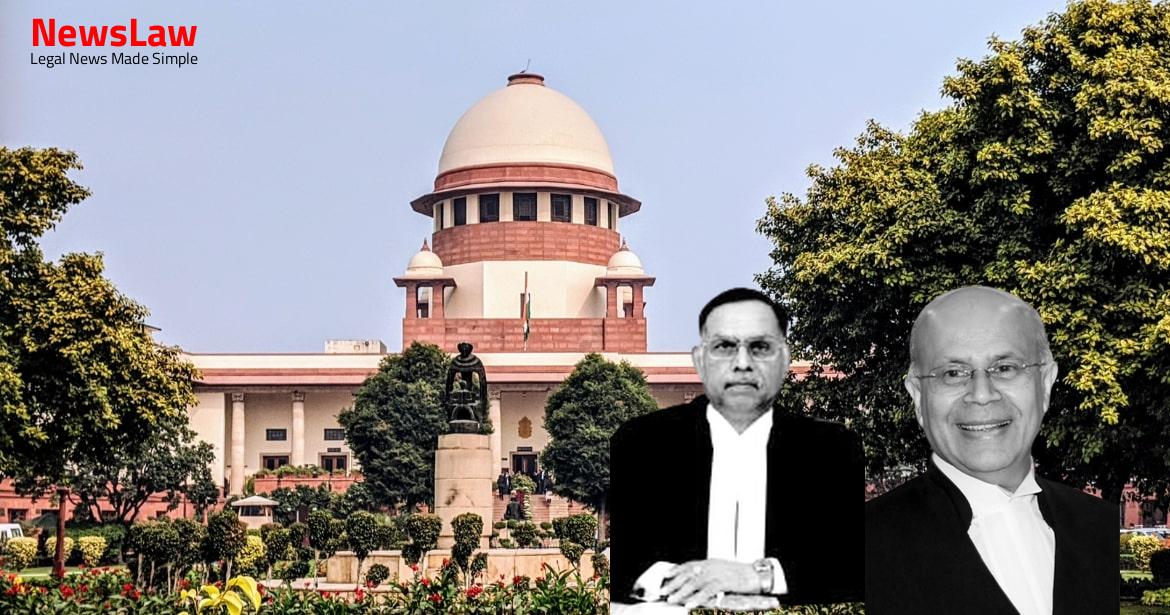In the Supreme Court case of Girija A. vs. State of Kerala, the judgment sheds light on the abatement of appeals and recovery of fines after the appellant’s death. The case involves a dispute regarding the continuation of a criminal appeal against a sentence of fine following the demise of the accused, Ramesan. Legal representatives seek to challenge the sentence of fine imposed by the High Court post the appellant’s passing. This summary delves into the legal intricacies and implications of the court’s decision.
Facts
- Statement of Ramesan recorded under Section 313 of Cr.P.C. denying the incident and charge.
- First Information Report registered against Ramesan under Sections 55(a) and (g) of the Kerala Abkari Act.
- Appeal filed against the judgment of the High Court of Kerala, which dismissed the Criminal Appeal of the appellant.
- Appeal now filed by Girija A., the legal heir of the deceased Ramesan.
- Prosecution presented oral and documentary evidence to prove the charge.
- Ramesan died on 21.12.2007 after filing the appeal.
- Charge under Sections 55(a) and (g) of the Kerala Abkari Act was framed.
- Criminal Appeal No. 254 of 2007 filed by Ramesan in the High Court on 06.02.2007.
- The accused was convicted under Sections 55(a) and (g) of the Abkari Act and sentenced to imprisonment and fines.
- The High Court upheld the conviction after considering the evidence on record.
- Due to the appellant’s death pending the appeal, the sentence of imprisonment became unworkable.
- The High Court still decided the appeal on merits based on the principle under Section 394 Cr.P.C.
Also Read: Interpretation of Lease Agreement and Compulsory Registration
Arguments
- Learned counsel for the appellant contended that in view of the death of the accused on 21.12.2007, the High Court ought to have abated the entire appeal.
- The State of Himachal Pradesh raised a preliminary objection to the right of the appellant’s widow to prosecute the appeal.
- Section 394 of Cr.P.C. saves the appeal against a sentence of fine only.
- If there is a composite sentence of imprisonment and fine, the appeal abates against both the sentence of imprisonment and fine.
- The High Court was contended to have erred in proceeding to decide the appeal on its merits instead of abating it in toto.
- The State’s counsel argued that since there was a sentence of fine, the appeal was rightly decided on its merits by the High Court.
- The key question was whether the High Court erred in not abating the appeal in toto for an accused sentenced for imprisonment as well as fine.
- Section 394 of Cr.P.C. states that every appeal except from a sentence of fine finally abates on the death of the appellant.
- In case of a conviction and sentence of death or imprisonment, the appeal does not abate if any near relative applies within thirty days for leave to continue the appeal.
- Cr.P.C. 1898 also had a provision for abatement of appeals.
- The substantive sentence of imprisonment imposed on the appellant Harnam Singh ended with his death, resulting in the appeal regarding that sentence standing abated.
Also Read: Enhancing Compensation and Modifying Sentences: A Legal Analysis
Analysis
- The plain meaning of Section 431 is that every criminal appeal abates on the death of the accused except an appeal from a sentence of fine.
- The question at hand is whether an appeal from a composite order of sentence combining substantive imprisonment with a fine falls under the exception in Section 431.
- The court rejected the argument that the appeal abates due to the appellant’s death and upheld that the appeal should continue on its merits.
- The legality of the order of conviction and the substantive sentence cannot be questioned following the appellant’s death.
- An appeal from a sentence of fine is applicable even when it is combined with a sentence of imprisonment.
- The principle regarding non-abatement of the appeal from a sentence of fine in Section 431 and Section 394 of the Cr.P.C. remains the same.
- In cases where the accused is sentenced to both imprisonment and fine, the appeal should be treated as an appeal against the fine and should not abate.
- Legal heirs can obtain leave under Section 394(2) to continue the appeal in case of the appellant’s death.
- The High Court correctly proceeded to consider the appeal on its merits instead of directing an abatement.
- Section 70 of the Indian Penal Code states that the death of the offender does not discharge any property that would be legally liable for his debts.
- The fine, or any part remaining unpaid, can be levied within six years after the sentence is passed or during the imprisonment period.
- The provision for recovery of fine includes issuing a warrant for levy of the amount by attachment and sale of movable property, or authorizing the Collector to realize the amount as arrears of land revenue.
- A sentence of fine shall not abate even after the death of the offender, as per the provisions of the Criminal Procedure Code.
- The fine can be recovered from both movable and immovable properties of the accused.
- The State Government can make rules for the execution of warrants and for determining claims made by persons other than the offender in respect of attached property.
- The Collector shall realize the amount as per the law related to recovery of arrears of land revenue when a warrant is issued under clause (b) of subsection (1) of Section 421 Cr.P.C.
- Section 70 of the Indian Penal Code allows for the levy of any unpaid fine within six years of passing the sentence.
- The High Court has the power to determine the case even after the death of the convicted person if a sentence of fine was imposed, as it affects the property of the deceased in the hands of his legal representative.
- In the case of Bondada Gajapathi Rao Vs. State of Andhra Pradesh, the accused died during the pendency of a special leave petition in the Supreme Court.
- The interpretation of Section 431 Cr.P.C. in Bondada Gajapathi Rao and Harnam Singh cases applies to the interpretation of Section 394 Cr.P.C. as well.
- Legal representatives are considered interested in proceedings if the sentence affects the property, allowing them to continue the case.
- In the case of a composite sentence of imprisonment and fine, as seen in Harnam Singh Vs. The State of Himachal Pradesh, legal representatives can be involved if the sentence impacts the property.
- After the death of the appellant-accused, his legal heirs were not given an opportunity to proceed with the appeal against the sentence of fine.
- The High Court judgment does not mention any counsel appearing for the legal heirs during the appeal proceedings.
- This lack of opportunity for the legal heirs to present their case is a significant aspect of the appeal hearing before the High Court.
Also Read: SPML Infra Limited vs. Govt. of Arunachal Pradesh
Decision
- The appeal before the High Court was against the sentence of fine.
- The High Court should have allowed the legal heirs of the accused to make submissions against the sentence of fine.
- The fine could have been recovered from the assets of the accused in the hands of the legal heirs.
- The ends of justice will be served by reviving Criminal Appeal No. 254 of 2007 before the High Court.
- The Legal heirs of the accused should be given an opportunity to make submissions against the sentence of fine.
- The judgment of the High Court dated 06.03.2014 is set aside.
- Criminal Appeal No.254 of 2007 is revived to be heard afresh before the High Court.
Case Title: RAMESAN (DEAD) THROUGH LR. GIRIJA A Vs. THE STATE OF KERALA (2020 INSC 66)
Case Number: Crl.A. No.-000077-000077 / 2020



